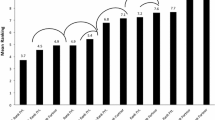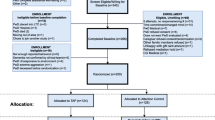Abstract
Poor engagement can lead to a reduced quality of life for individuals with neurocognitive disorder (NCD). Research on determining preference and increasing engagement with this population is limited. The purpose of this study was to compare the accuracy of four preference assessment formats in identifying preferred activities and predicting engagement for six females with NCD and to measure the stability of preference and engagement over time. We compared the predictability of single-stimulus(SS) verbal and multimedia assessments, caregiver ranking (CR) assessments, and multiple-stimulus without-replacement (MSWO) assessments. Participants responded consistently on SS assessments, but we noted inconsistencies between the CR and MSWO assessments. SS assessments predicted engagement during engagement analyses, but rank-order assessments did not predict engagement for moderately ranked activities. The rank-order assessments predicted engagement for highly ranked activities for most participants and for low-ranked activities for two participants. We also evaluated the stability of preferences and engagement over time. Participants responded consistently on SS assessments and inconsistently on MSWO assessments across time. SS assessments consistently predicted engagement during engagement analyses for five participants, but when activity rank is considered, the MSWO was inconsistent in predicting engagement across time for most participants. These results suggest that SS assessments may be useful for identifying preferred activities and engagement, and preferences may remain stable for some individuals with NCD.





Similar content being viewed by others
References
American Psychiatric Association. (2013). Diagnostic and statistical manual of mental disorders (5th ed.).
Buchanan, J., Husfeldt, J., Berg, T., & Houlihan, D. (2008). Publication trends in behavioral gerontology in the past 25 years: Are the elderly still an understudied population in behavioral research? Behavioral Interventions, 23(1), 65–74. https://doi.org/10.1002/bin.254
Burshnic, V. L., & Bourgeois, M. S. (2020). A seat at the table: Supporting persons with severe dementia in communicating their preferences. Clinical Gerontologist, 43, 1–14. https://doi.org/10.1080/07317115.2020.1764686
Daly III, E. J., Wells, N. J., SwangerGagné, M. S., Carr, J. E., Kunz, G. M., & Taylor, A. M. (2009). Evaluation of the multiple-stimulus without replacement preference assessment method using activities as stimuli. Journal of Applied Behavior Analysis, 42(3), 563–574. https://doi.org/10.1901/jaba.2009.42-563
Engelman, K. K., Altus, D. E., & Mathews, R. M. (1999). Increasing engagement in daily activities by older adults with dementia. Journal of Applied Behavior Analysis, 32(1), 107–110. https://doi.org/10.1901/jaba.1999.32-107
Feliciano, L., Steers, M. E., Elite-Marcandonatou, A., McLane, M., & Areán, P. A. (2009). Applications of preference assessment procedures in depression and agitation management in elders with dementia. Clinical Gerontologist, 32(3), 239–259. https://doi.org/10.1080/07317110902895226
Fisher, W., Piazza, C. C., Bowman, L. G., Hagopian, L. P., Owens, J. C., & Slevin, I. A. (1992). A comparison of two approaches for identifying reinforcers for persons with severe and profound disabilities. Journal of Applied Behavior Analysis, 25(2), 491–498. https://doi.org/10.1901/jaba.1992.25-491
LeBlanc, L. A., Cherup, S. M., Feliciano, L., & Sidener, T. M. (2006). Using choice-making opportunities to increase activity engagement in individuals with dementia. American Journal of Alzheimer’s Disease and Other Dementias, 21(5), 318–325. https://doi.org/10.1177/1533317506292183
LeBlanc, L. A., Raetz, P. B., Baker, J. C., Strobel, M. J., & Feeney, B. J. (2008). Assessing preference in elders with dementia using multimedia and verbal pleasant events schedules. Behavioral Interventions, 23(4), 213–225. https://doi.org/10.1002/bin.266
Logsdon, R. G., & Teri, L. (1997). The Pleasant Events Schedule-AD: Psychometric properties and relationship to depression and cognition in Alzheimer’s disease patients. Gerontologist, 37, 40–45. https://doi.org/10.1093/geront/37.1.40
Piazza, C. C., Roane, H. S., & Karsten, A. (2011). Identifying and enhancing the effectiveness of positive reinforcement. In W. W. Fisher, C. C. Piazza, & H. S. Roane (Eds.), Handbook of applied behavior analysis (pp. 151–164). The Guilford Press.
Raetz, P. B., LeBlanc, L. A., Baker, J. C., & Hilton, L. C. (2013). Utility of the multiple-stimulus without replacement procedure and stability of preferences of older adults with dementia. Journal of Applied Behavior Analysis, 46(4), 765–780. https://doi.org/10.1002/jaba.88
Roscoe, E. M., & Fisher, W. W. (2008). Evaluation of an efficient method for training staff to implement stimulus preference assessments. Journal of Applied Behavior Analysis, 41(2), 249–254. https://doi.org/10.1901/jaba.2008.41-249
Wagner, S., Buchanan, J. A., Bailey, J., Andresen, F. J., & Omlie, C. (2020). The use of stimulus preference assessments for persons with neurocognitive disorder: A literature review. Clinical Gerontologist, 43, 243–255. https://doi.org/10.1080/07317115.2019.1670313
World Health Organization. (2016). Dementia fact sheet. http://www.who.int/mediacentre/factsheets/fs362/en/
Availability of data and material
All data and material are available for review.
Code availability
All data are stored on GraphPad Prism and available for review.
Funding
No funds, grants, or other support was received.
Author information
Authors and Affiliations
Corresponding author
Ethics declarations
Ethical approval
This research involved human participants. Approval for the research was obtained through a university institutional review board process.
Informed consent
All participants and their legal guardians provided written consent to participate.
Compliance with Ethical Standards
This research involved human participants. Approval for the research was obtained through a university IRB process. All participants and their legal guardians provided written consent to participate. This article has not been previously published and will not be submitted elsewhere during the reviewprocess.
Additional information
Publisher’s note
Springer Nature remains neutral with regard to jurisdictional claims in published maps and institutional affiliations.
Author Note
This article is based on the master’s thesis completed by Megan N. Ford and supervised by Makenzie W. Bayles. We would like to express our gratitude to Dr. Paige McKerchar for feedback throughout this study. We also wish to acknowledge the much-appreciated efforts of Sara Posey Gaines, Alannah Knight, and Amanda Miles in assisting with data collection.
Rights and permissions
About this article
Cite this article
Ford, M.N., Bayles, M.W. & Bruzek, J.L. Assessing Preference and Stability of Preference for Individuals with Neurocognitive Disorder. Behav Analysis Practice 15, 782–795 (2022). https://doi.org/10.1007/s40617-021-00648-7
Accepted:
Published:
Issue Date:
DOI: https://doi.org/10.1007/s40617-021-00648-7




